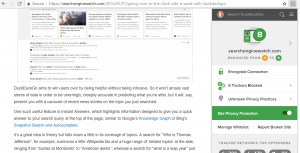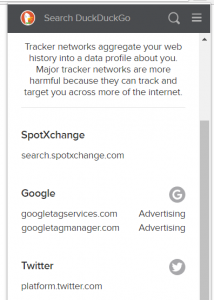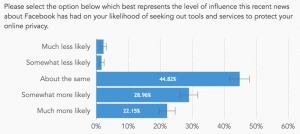We’ve covered DuckDuckGo many times here at Search Engine Watch (check out Rebecca Sentence’s great primer here). This month sees the privacy-first search engine turn 10 – an impressive age for any business that boasts Google and Bing as its main competitors.
The 10-year anniversary coincides with a major funding boost for the service. This comes courtesy of Canadian pension fund Omers who have invested $10m to assist with expansion into Canada and further global impact. While DuckDuckGo’s worldwide search market share might currently be tiny compared to Google et al. (less than 0.39% according to StatCounter), it is clear there are tech disruptors beyond the walls of the business itself who continue to see great potential for growth as the digital landscape evolves.
So how has DuckDuckGo grown in recent years? And is there still a viable pull from the duck side as the service enters its second decade?
DuckDuckGo: The search engine that doesn’t track you
As we’ll discuss later, DuckDuckGo has evolved to become more than just a search engine during its first 10 years. But first, let’s recap on this element of the company and how it sets itself apart.
Launched in 2008, DuckDuckGo gave users the option to search the web without having their IP addresses, search history, or any other user data stored save for some essential cookies. It has its own web crawler, and its SERPs bolster this primary source with hundreds of other secondary sources such as Yahoo! and Wikipedia – as well as ads from the Yahoo-Bing network (but these are not tracked).
In a nutshell, complete privacy is DuckDuckGo’s USP. There are no filter bubbles for users because there are no user profiles. The same results are delivered to everyone regardless of their demographic, location, user behavior, etc.
Thanks to the un-tracked ads and affiliate partnerships it runs, the company has managed to be profitable since 2014. It makes a point of diverting some of these profits as donations to start-ups and projects who share a similar philosophy to their own.
DuckDuckGo: The privacy company
The search engine arm of DuckDuckGo certainly has its fans, averaging 24m daily direct searches last month. But the company is broadening its appeal by working to make it even easier for the average internet user (i.e. those who might not be familiar with VPNs or Tor) to be able to retain their privacy throughout their online journeys beyond just making searches.
In the first place, the latest iteration of the DuckDuckGo app and browser extension helps demystify just how tracked we are online. As each webpage loads, DuckDuckGo provides users with a ‘Privacy Grade’ (A is safe, D to F are not so) allowing them to make a quick assessment. With just a click or two, users can then see a list of the trackers it has identified on the site.
This tracker visibility is enlightening. For readers from Europe who are used to the EU Cookie Directive, it is a lot more usable and transparent than the varying quality of warning pop-ups we’re used to. Trackers that seem to crop up with frequency often relate to Google advertising – but it doesn’t take much browsing before trackers from big media names such as AOL and Fox are noticed, as well as expected Web 2.0 businesses such as Facebook, Twitter, and Amazon. Of course, this is after just a few minutes of surfing. We can quickly see tracker after tracker with more and more obscure names.
As we move around the web, DuckDuckGo immediately gets to work blocking these trackers. It also forces sites, when possible, to use encryption to keep your data even more secure. The tool doesn’t promise 100% security across the internet, but when it can’t impose its tweaks or be sure of certain elements, the Privacy Grade and information at least highlights a site’s failings and alerts users to potential nefarious scripts. If DuckDuckGo can successfully block a site’s trackers (it usually can), it will offer an amended grade for that site after it has done its work. And if a user decides it doesn’t want DuckDuckGo to make its changes, they can easily whitelist any site they like with a single click.
The increasing need for the duck side
It is unsurprising that DuckDuckGo hit new heights of popularity earlier this year in the wake of the Cambridge Analytica scandal. It is precisely this kind of creepy data breach which the company is working to protect internet users from.
In a post at the DuckDuckGo blog, the company published the results from a survey of US internet users in the weeks after the scandal which found growing concerns in online privacy and the consequent increasing interest in tools which help to make web use safer. It also points out that regardless of whether internet users have a profile on the site or not, Facebook-run trackers operate on around 25% of websites, collecting user data and creating shadow profiles for ad targeting even if you never visit the social network’s domain.
Tracking hit the headlines again last month as numerous scripts were found to be operating on US school websites. Of course, not all trackers are bad. Yet it is unsurprising parents and technologists in the US are asking some big questions about student data and where it ends up as they are increasingly expected to engage with their schools online.
However, arguably some of the most significant privacy questions which might convince users to consider DuckDuckGo’s search engine and app/extension emerge from recent reports surrounding Google’s storing of location data even after users have turned this functionality off. The search giant is being sued by a user for just such activity in San Diego, and this again raises concerns about who really owns our personal data even if it appears that we, as users, can opt out of having such information stored.
DuckDuckGo’s future
This latest round of investment and the near-weekly headlines about data breaches, dodgy tracking, and dishonest privacy practices are good news for DuckDuckGo. The company still has a difficult job competing in the pure search vertical. Private search is, after all, not a completely original pursuit when Startpage and even incognito searching via Google Chrome is also an option for users seeking to make private searches.
But where DuckDuckGo have really made great progress in recent years is by broadening their reach to assist web users to browse in private beyond search. The privacy app/extension is both educational when it comes to reminding users of the ubiquity of ad trackers and other bad practice, and it is useful and practical for making browsing the web that bit more secure.
The future of online data and privacy is hard to predict, but it is good that companies like DuckDuckGo are working to make the internet a safer, more transparent, space – one that is led by the rights of users, rather than the desires of advertisers. This is especially important when so many of the bigger digital names seem to find it so difficult to operate in such a way.
source https://searchenginewatch.com/marking-ten-years-duckduckgo-search-engine-privacy-company



No comments:
Post a Comment